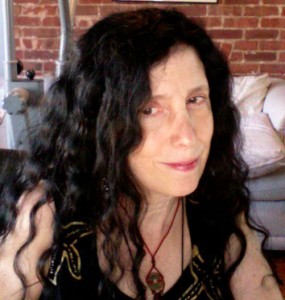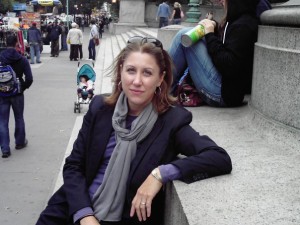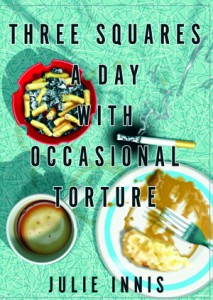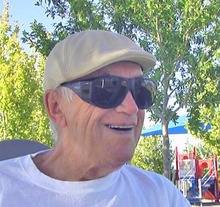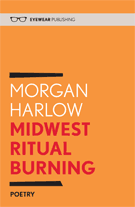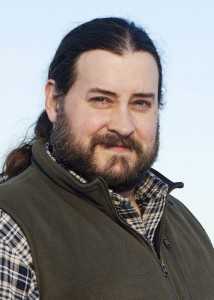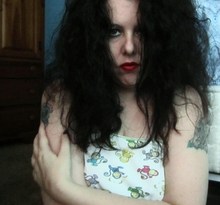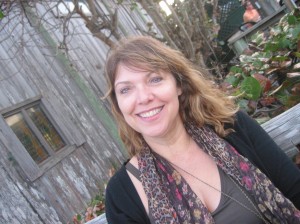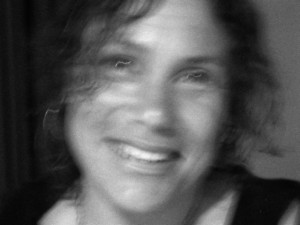
Susan Tepper: Dennis, your beautiful poem “Rods and Cones“ worked for me as a sort of guided imagery. I felt it even before reading what you posted in the author’s comment on the sidebar.
Dennis Mahagin: Susan, thanks so much, and for taking the time to talk with me! I just love your term, “guided imagery.” Because that’s what poetry basically is. Right?
Interestingly, “Rods and Cones” was born from the ashes of a previously failed narrative poem. Originally I’d been trying to write about a blind guy I saw sitting on a stone bench outside my library. Some mean kids were sort of messing with him, i.e., jumping in and out of what would be his field of vision, had God not deprived him, etc. Well, as is sometimes the case for me, this “mining of direct experience” did not translate to the page. The eye — or I — “looking in” got clouded by self consciousness, and pretension. So I tried flipping the poem on its head, essentially writing it from the “inside out” going lyric, instead of story, and just letting the language take the lead.
Once a couple of decent lines formed, in this way — plus the title — I could sense something happening, and I went with it. The poem finished itself fairly quickly after that.
Susan: I notice that you favor the short line and it’s always just so perfect, and feels like a jazz riff to me. Is there music in your background, such as: do you play an instrument or write music?
Dennis: You bet, Susan, I do have a background in music! I studied theory and composition in college, and became a competent bassist through many years of playing in bands. A couple of these bands actually afforded me a marginal living, playing Top 40 and classic rock covers, in the 80’s and 90’s; but my dream of being the next Jeff Ament, or Flea, never quite materialized. I worked pretty hard at my musicianship, however; and I’m proud of the level of expertise I did attain. I still play my bass; occasionally I’ll write a song on acoustic guitar. Not the same as poetry, but kinda fun, as a sidelight.
Susan: You write:
A God with no / sentience; heaven / by increments / in the here / now repeating / dawn’s pink / halo in a blink / gone…
I have heard this referred to as “making leaps”– as described by the beat poet Paul Blackburn. You have made a few big leaps here using the barest minimum of words. It ain’t easy, but you make it appear effortless. I believe it’s a poetic gift you’ve been handed by the Gods of poetry.
Dennis: Often, for me, it comes down to rhythm, and a certain assonance, to get the ball rolling. For instance, in the first stanza, the words “sentience” and “increments.”
Intuitively, I know these words belong together, in a part of the mind that works almost faster than thought. This is what makes poetry maddening sometimes — in that one receives the information (or inspiration) so fast, the faculties sometimes can’t catch up. So, you must “get down” what you can, while holding on to the image or feeling that is the poem’s very essence, before it fades. I think that’s where the “leaps” you mentioned really come in: it’s the writer working just as hard as he or she can, to keep up with the inspiration. Like a bullet train. Whoooosh ! Then, of course, there comes a shift to memory. Because of time, for the writer, imagination comes down to remembering in almost every instance. Which isn’t to say “revision.” Although one must revise, also. That’s a whole different can of beans.
Susan: How much revision do you normally do? I guess that’s a dumb question because it will vary from poem to poem, but do you always revise? Does it ever come out without need of revision?
Dennis: I’m a firm believer in the adage: Writing is re-writing. The poem we’ve been discussing, for instance, went through fifteen or sixteen drafts; and that was after I got the piece on the right track! I try to keep an open mind, of course, from poem to poem (and as you said, it really does vary) but usually it’s the poems one thinks have arrived with no need for revising that could most benefit by revision. One ought to be encouraged, by the amount of time spent polishing a piece. It means, from an unconscious point of view, that the poem is no doubt worth the effort. The old Aha moment, revisited, over and over.
The notion that, as I mentioned earlier, a writer might be “on to something,” but maybe it’s not quite there yet. I think in terms of a tinsmith, when I conceive of revision. A somewhat crazy tinsmith.
Susan: You write:
Search the church / bells that never / “pealed” per se, / only saved your / will to live, to see / light another / day; they spoke / in a way that / woke you /
This poem is a heartbreaker. I am feeling slaughtered here as I read it again, and talk with you about it. This poem, to me, is painful in the way enlightened thinking can be painful, or a sudden realization that one’s life has been a waking death.
Dennis: Indeed. I read an interview with one of my favorite poets, Dorianne Laux, not too long ago. Toward the end of this interview she said, of her poetry: “I want blood.” Not in the gratuitous sense, obviously. Nor even necessarily graphic, although her poems are often cinematic, certainly. I believe Dorianne is driving at desire. Always. Blood of the heart, so to speak. A desire to write about the stuff that really matters. Tropes that can hit a reader three times as hard when you re-visit the work, which of course one is compelled to do, with a poet as powerful as Laux. It goes beyond craft, she’s saying. And if it makes the reader uncomfortable, she might add, so much the better. This is why people will be reading her poems in what Corso called “the after” or the Divine. Readers want blood too.
Susan: Do you have strong religous or spiritual beliefs? It would be hard to imagine an atheist or agnostic writing such a poem as “Rods and Cones.”
Dennis: While I’m not a huge fan of organized religion, I do believe in God. And angels, like the ones Thylias Moss writes about. I have absolutely no doubt I met an angel once, though my conviction is both clouded by and coalesced upon hindsight. That old problem with remembering, again! There are simply realms to which we as human beings are not necessarily privy, most times. But just because you can’t see a thing, doesn’t mean it’s not there. Au contraire! And I like prayer a lot. Poetry is a particularly human brand of prayer.
Susan: Dennis, as you have so succinctly put it: “Poetry is a particularly human form of prayer.”
I believe in all spirit life, angels, demons, God and the like. Because I often write so-called ‘nature poems’ I sense the spirit life in all growing things, in the change of seasons, in animal life. Do you write ‘nature poems’ and also how would you classify “Rods and Cones”?
Dennis: Sure, I’ve attempted nature poems. Birds absolutely fascinate me! Especially crows, and gulls. I’m also enamored of anything maritime: Coastal climes, the moon and tides. Foghorns, and whale song, all that stuff. More and more, as well, I find myself drawn to the pastoral motif in general, as it attempts to plumb the mystery of simplicity, in a world of numbing complexity.
I’m a huge fan of the poet, August Kleinzahler, for this very reason. His work has a miraculous sort of calming effect on me. Check out his poem called “The Swimmer” for one great example.
To answer the second part of your question, I honestly don’t know how to classify the poem, Rods and Cones. I guess you could call it a lament, with hope. At least I hope there’s some hope! It was my intention, anyway.
Susan: This beautiful poem fills me with a sense of wonder and optimism. Those qualities come forth in all your poems, even when you write of dark matter. “Rods and Cones” does ring, shout, and radiate the hope you speak of. Hope that is desperately needed for our wildly spinning planet, in these wildly spinning times.
Read “Rods and Cones“ by Dennis Mahagin
Monday Chat is a bi-weekly series in which Susan Tepper has a conversation with a Fictionaut writer about one of his or her stories. Susan’s new book From the Umberplatzen is a collection of linked-flash published by Wilderness House Press.

